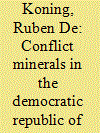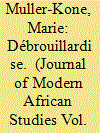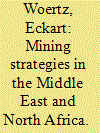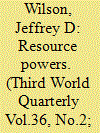| Srl | Item |
| 1 |
ID:
093596


|
|
|
| 2 |
ID:
108027


|
|
|
|
|
| Publication |
Stockholm, SIPRI, 2011.
|
| Description |
vi, 42p.
|
| Series |
SIPRI policy paper 27 June 2011
|
| Standard Number |
9789185114641
|
|
|
|
|
|
|
|
|
|
|
|
Copies: C:1/I:0,R:0,Q:0
Circulation
| Accession# | Call# | Current Location | Status | Policy | Location |
| 056279 | 338.2096751/KON 056279 | Main | On Shelf | General | |
|
|
|
|
| 3 |
ID:
146117


|
|
|
|
|
| Summary/Abstract |
This article explores the relationship between transnational governance initiatives for ‘conflict-free’ certification in the eastern provinces of the Democratic Republic of the Congo (DRC) and the regulatory pluralism one finds on the ground. Efforts in certifying artisanal gold mining are scrutinised by analysing how three different gold mining sites in the DRC's South Kivu province are governed. Most artisanal mining in the DRC is usually referred to as ‘informal’ – a term associated with non-state actors. Instead, the article introduces the idea of a mode of governing that follows the principle of ‘débrouillardise’, which combines different rule systems and state and non-state regulators. It argues that ‘conflict-free’ governance will need to improvise via ad hoc agreements on the legal status of mining sites among state authorities, economic actors and international monitors. The act of declaring mining sites legal will provide for the semblance of a ‘conflict-free’ status and a unitary state system of rule, while in practice, the plurality of regulatory authority will not be reversed.
|
|
|
|
|
|
|
|
|
|
|
|
|
|
|
|
| 4 |
ID:
125940


|
|
|
|
|
| Publication |
2013.
|
| Summary/Abstract |
KINSHASA, Congo-Joachim Andersson owned and operated a string of failed businesses before he founded Mineral Invest and began mining for gold in eastern Democratic Republic of Congo. During the 1980s, Andersson worked as a pastry chef at an all-night café in a Stockholm suburb. It was the kind of place frequented by taxi drivers and prostitutes. Stolen goods were fenced in the café, and Andersson learned about precious metals. During the 1990s, he began dealing in minerals from Africa, and he was sentenced to five years in prison for tax evasion relating to importing gold.
|
|
|
|
|
|
|
|
|
|
|
|
|
|
|
|
| 5 |
ID:
135040


|
|
|
|
|
| Summary/Abstract |
This article provides a mapping exercise of the economic importance of non-hydrocarbon minerals (nhm) in the Middle East and North Africa (mena) and shows how governments in the region increasingly perceive them as strategic resources. The focus is on Saudi Arabia and other Gulf countries, Turkey, Morocco and Iran. nhm like iron ore, phosphates, aluminium and uranium are important for development models in the region, either as export commodities or as vital input factors. Since the 1990s, and as elsewhere in the world, the sector has witnessed privatisation and the promulgation of new mining codes. Yet governments have retained core capabilities and manage most key commodities themselves either directly or indirectly. Mining projects have met with opposition from labour representatives. They also have considerable environmental impact. The article discusses rentier state and resource curse theories, but argues that nhm have also increased development options and have contributed to economic diversification rather than being just a curse.
|
|
|
|
|
|
|
|
|
|
|
|
|
|
|
|
| 6 |
ID:
137725


|
|
|
|
|
| Summary/Abstract |
The rise of new economic powers has seen increasing attention focused on the international role of the BRICS countries. Importantly, a common feature uniting the BRICS is that they are all resource-rich, and many analysts (and some BRICS governments) have argued that natural resources are one of the key factors propelling the rise of the group. This article explores the BRICS’ emerging status as ‘resource powers’, examining how resource wealth underpins their economic development and foreign policy strategies, and thus contributes to their growing influence in international affairs. It is argued that through the use of nationalistic mining and energy policies, the BRICS governments have exploited natural resources for both domestic economic and international diplomatic objectives. However, there are several challenges and emerging risks facing the BRICS’ resource strategies, which mean that resource wealth is making a positive – though inherently limited – contribution to the growing international status of the group.
|
|
|
|
|
|
|
|
|
|
|
|
|
|
|
|